NRSG355 Clinical Integration: Delegation and Collaborative Report
VerifiedAdded on 2023/06/11
|6
|1308
|200
Report
AI Summary
This report addresses key aspects of nursing practice, including prioritization of patient care, delegation of tasks, and collaborative practice within multidisciplinary healthcare teams. It begins with a scenario-based prioritization exercise, ranking responsibilities based on urgency and patient needs, followed by a discussion on the role of healthcare professionals in managing Motor Neuron Disease, emphasizing the importance of a multidisciplinary approach and case management. A case study involving a client with intellectual disability and aggressive outbursts is also analyzed, identifying necessary healthcare team members and strategies for care. The report concludes with relevant references, highlighting the integration of theoretical knowledge with practical application in nursing.
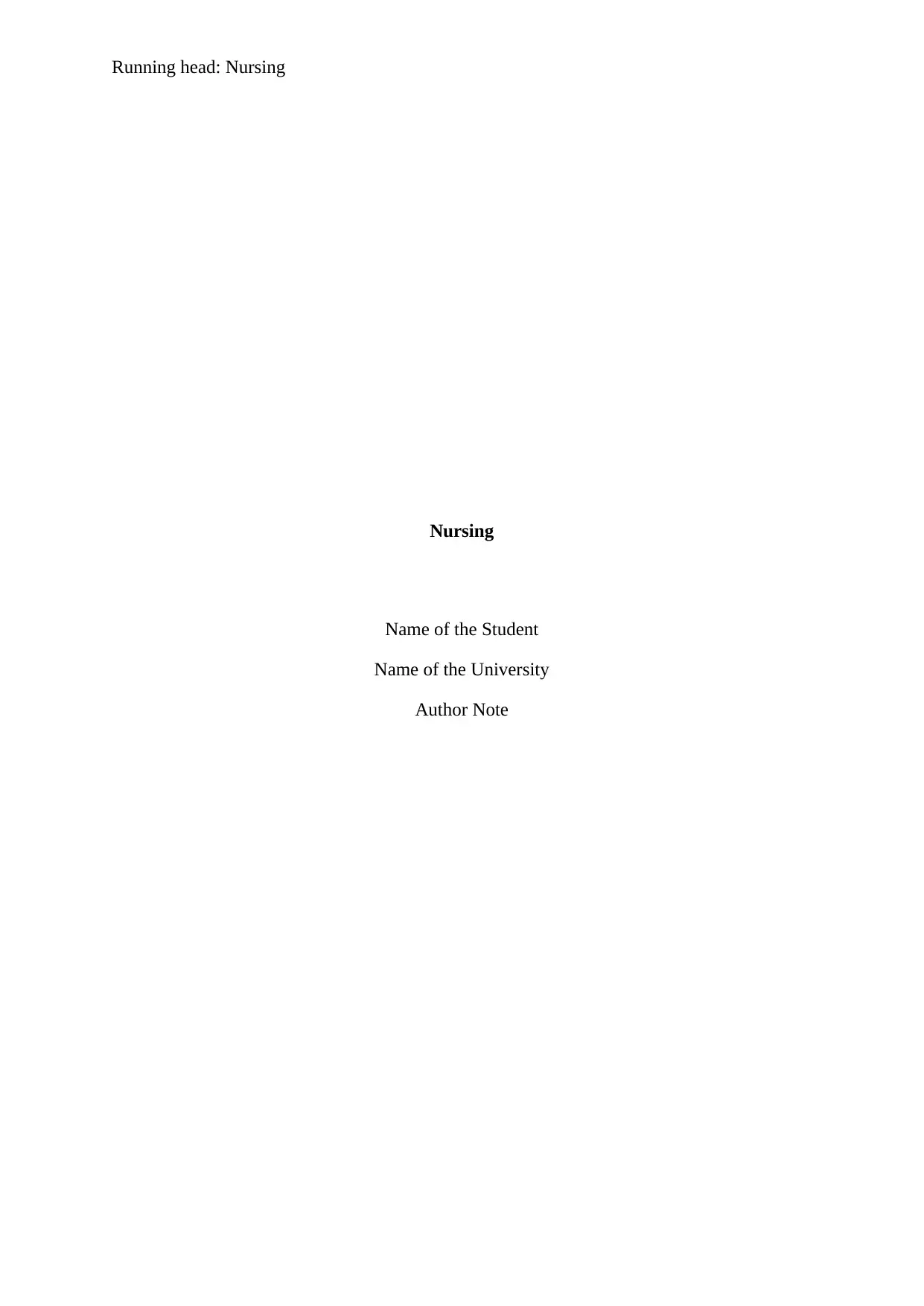
Running head: Nursing
Nursing
Name of the Student
Name of the University
Author Note
Nursing
Name of the Student
Name of the University
Author Note
Paraphrase This Document
Need a fresh take? Get an instant paraphrase of this document with our AI Paraphraser
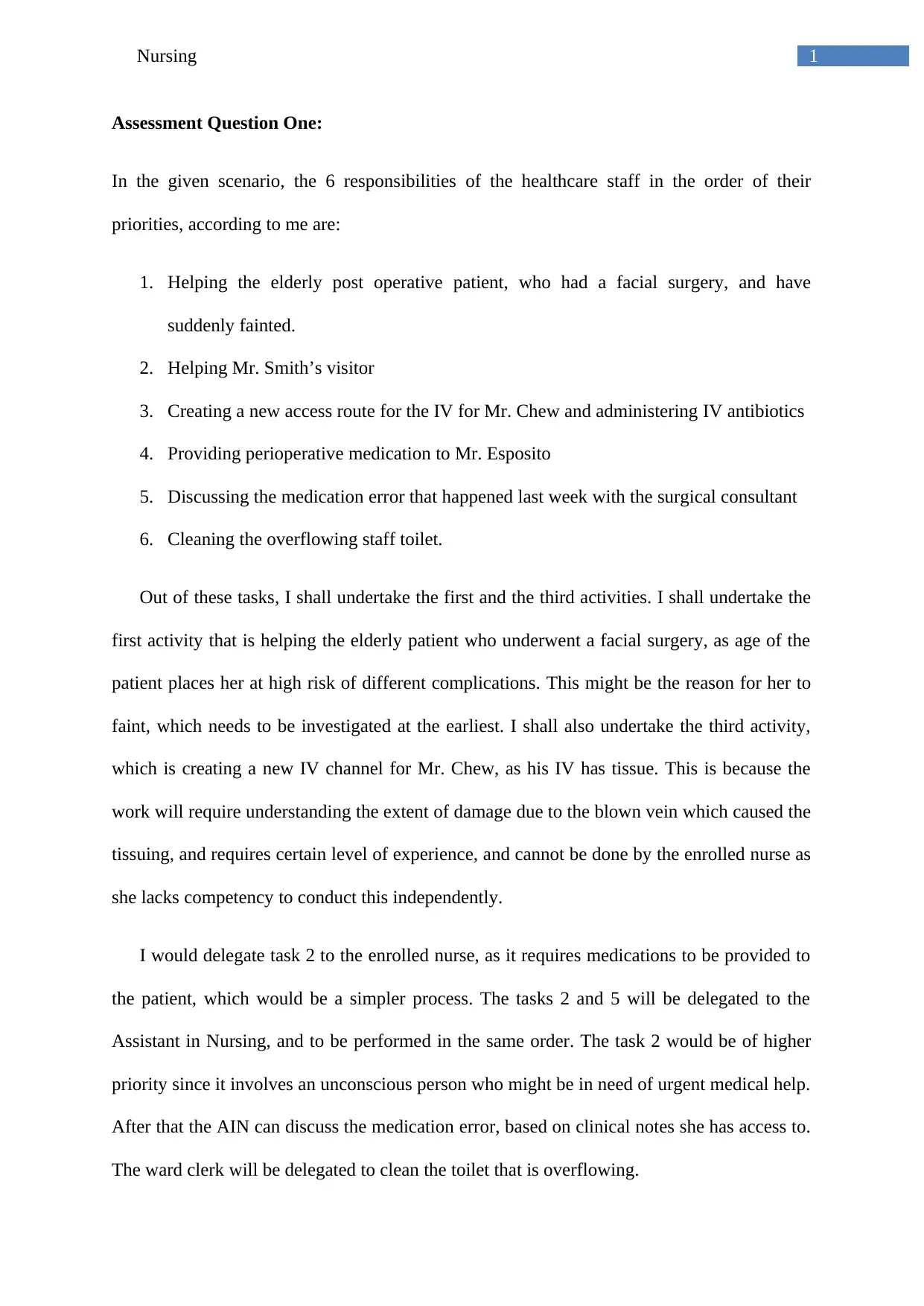
1Nursing
Assessment Question One:
In the given scenario, the 6 responsibilities of the healthcare staff in the order of their
priorities, according to me are:
1. Helping the elderly post operative patient, who had a facial surgery, and have
suddenly fainted.
2. Helping Mr. Smith’s visitor
3. Creating a new access route for the IV for Mr. Chew and administering IV antibiotics
4. Providing perioperative medication to Mr. Esposito
5. Discussing the medication error that happened last week with the surgical consultant
6. Cleaning the overflowing staff toilet.
Out of these tasks, I shall undertake the first and the third activities. I shall undertake the
first activity that is helping the elderly patient who underwent a facial surgery, as age of the
patient places her at high risk of different complications. This might be the reason for her to
faint, which needs to be investigated at the earliest. I shall also undertake the third activity,
which is creating a new IV channel for Mr. Chew, as his IV has tissue. This is because the
work will require understanding the extent of damage due to the blown vein which caused the
tissuing, and requires certain level of experience, and cannot be done by the enrolled nurse as
she lacks competency to conduct this independently.
I would delegate task 2 to the enrolled nurse, as it requires medications to be provided to
the patient, which would be a simpler process. The tasks 2 and 5 will be delegated to the
Assistant in Nursing, and to be performed in the same order. The task 2 would be of higher
priority since it involves an unconscious person who might be in need of urgent medical help.
After that the AIN can discuss the medication error, based on clinical notes she has access to.
The ward clerk will be delegated to clean the toilet that is overflowing.
Assessment Question One:
In the given scenario, the 6 responsibilities of the healthcare staff in the order of their
priorities, according to me are:
1. Helping the elderly post operative patient, who had a facial surgery, and have
suddenly fainted.
2. Helping Mr. Smith’s visitor
3. Creating a new access route for the IV for Mr. Chew and administering IV antibiotics
4. Providing perioperative medication to Mr. Esposito
5. Discussing the medication error that happened last week with the surgical consultant
6. Cleaning the overflowing staff toilet.
Out of these tasks, I shall undertake the first and the third activities. I shall undertake the
first activity that is helping the elderly patient who underwent a facial surgery, as age of the
patient places her at high risk of different complications. This might be the reason for her to
faint, which needs to be investigated at the earliest. I shall also undertake the third activity,
which is creating a new IV channel for Mr. Chew, as his IV has tissue. This is because the
work will require understanding the extent of damage due to the blown vein which caused the
tissuing, and requires certain level of experience, and cannot be done by the enrolled nurse as
she lacks competency to conduct this independently.
I would delegate task 2 to the enrolled nurse, as it requires medications to be provided to
the patient, which would be a simpler process. The tasks 2 and 5 will be delegated to the
Assistant in Nursing, and to be performed in the same order. The task 2 would be of higher
priority since it involves an unconscious person who might be in need of urgent medical help.
After that the AIN can discuss the medication error, based on clinical notes she has access to.
The ward clerk will be delegated to clean the toilet that is overflowing.
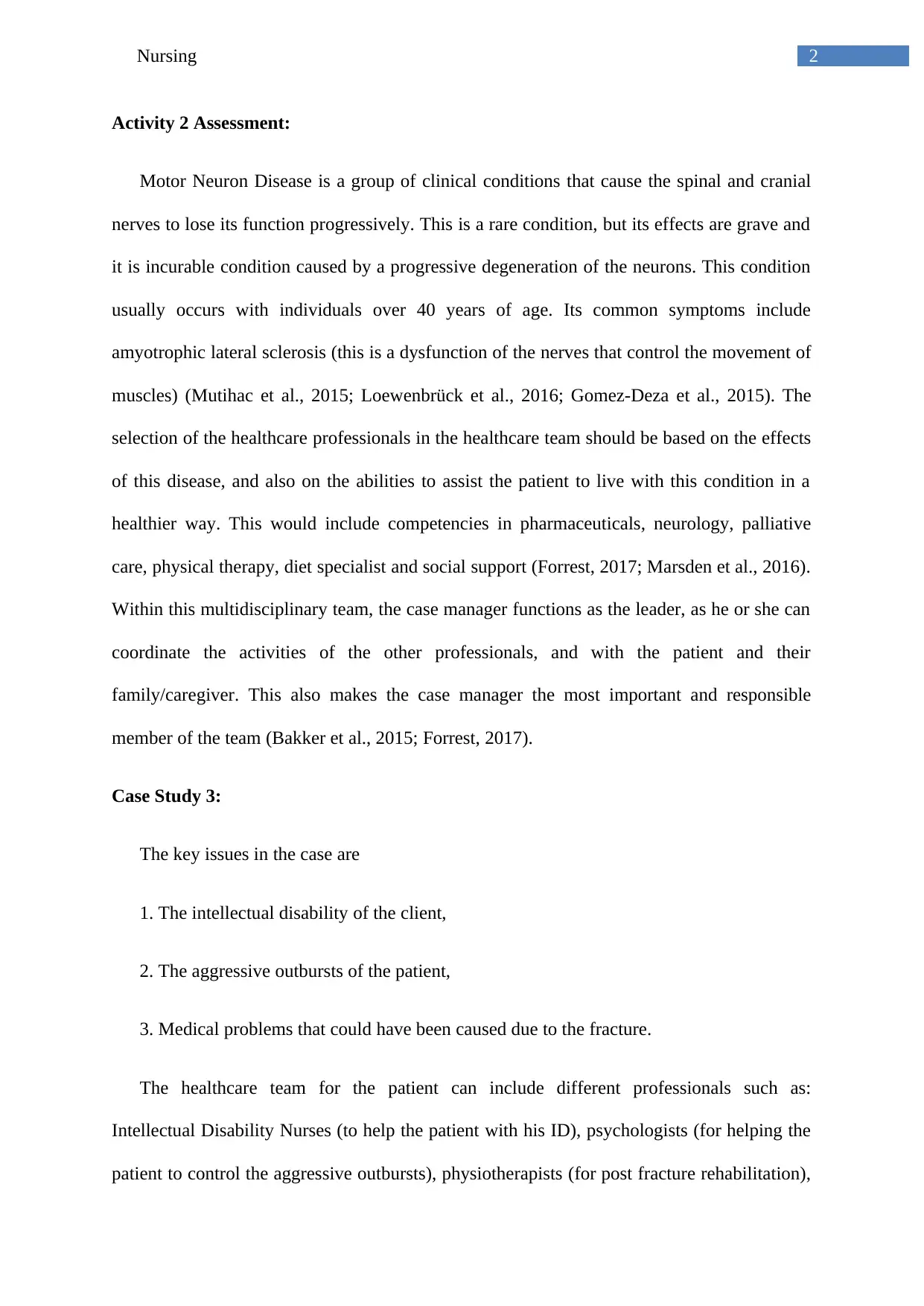
2Nursing
Activity 2 Assessment:
Motor Neuron Disease is a group of clinical conditions that cause the spinal and cranial
nerves to lose its function progressively. This is a rare condition, but its effects are grave and
it is incurable condition caused by a progressive degeneration of the neurons. This condition
usually occurs with individuals over 40 years of age. Its common symptoms include
amyotrophic lateral sclerosis (this is a dysfunction of the nerves that control the movement of
muscles) (Mutihac et al., 2015; Loewenbrück et al., 2016; Gomez-Deza et al., 2015). The
selection of the healthcare professionals in the healthcare team should be based on the effects
of this disease, and also on the abilities to assist the patient to live with this condition in a
healthier way. This would include competencies in pharmaceuticals, neurology, palliative
care, physical therapy, diet specialist and social support (Forrest, 2017; Marsden et al., 2016).
Within this multidisciplinary team, the case manager functions as the leader, as he or she can
coordinate the activities of the other professionals, and with the patient and their
family/caregiver. This also makes the case manager the most important and responsible
member of the team (Bakker et al., 2015; Forrest, 2017).
Case Study 3:
The key issues in the case are
1. The intellectual disability of the client,
2. The aggressive outbursts of the patient,
3. Medical problems that could have been caused due to the fracture.
The healthcare team for the patient can include different professionals such as:
Intellectual Disability Nurses (to help the patient with his ID), psychologists (for helping the
patient to control the aggressive outbursts), physiotherapists (for post fracture rehabilitation),
Activity 2 Assessment:
Motor Neuron Disease is a group of clinical conditions that cause the spinal and cranial
nerves to lose its function progressively. This is a rare condition, but its effects are grave and
it is incurable condition caused by a progressive degeneration of the neurons. This condition
usually occurs with individuals over 40 years of age. Its common symptoms include
amyotrophic lateral sclerosis (this is a dysfunction of the nerves that control the movement of
muscles) (Mutihac et al., 2015; Loewenbrück et al., 2016; Gomez-Deza et al., 2015). The
selection of the healthcare professionals in the healthcare team should be based on the effects
of this disease, and also on the abilities to assist the patient to live with this condition in a
healthier way. This would include competencies in pharmaceuticals, neurology, palliative
care, physical therapy, diet specialist and social support (Forrest, 2017; Marsden et al., 2016).
Within this multidisciplinary team, the case manager functions as the leader, as he or she can
coordinate the activities of the other professionals, and with the patient and their
family/caregiver. This also makes the case manager the most important and responsible
member of the team (Bakker et al., 2015; Forrest, 2017).
Case Study 3:
The key issues in the case are
1. The intellectual disability of the client,
2. The aggressive outbursts of the patient,
3. Medical problems that could have been caused due to the fracture.
The healthcare team for the patient can include different professionals such as:
Intellectual Disability Nurses (to help the patient with his ID), psychologists (for helping the
patient to control the aggressive outbursts), physiotherapists (for post fracture rehabilitation),
⊘ This is a preview!⊘
Do you want full access?
Subscribe today to unlock all pages.

Trusted by 1+ million students worldwide
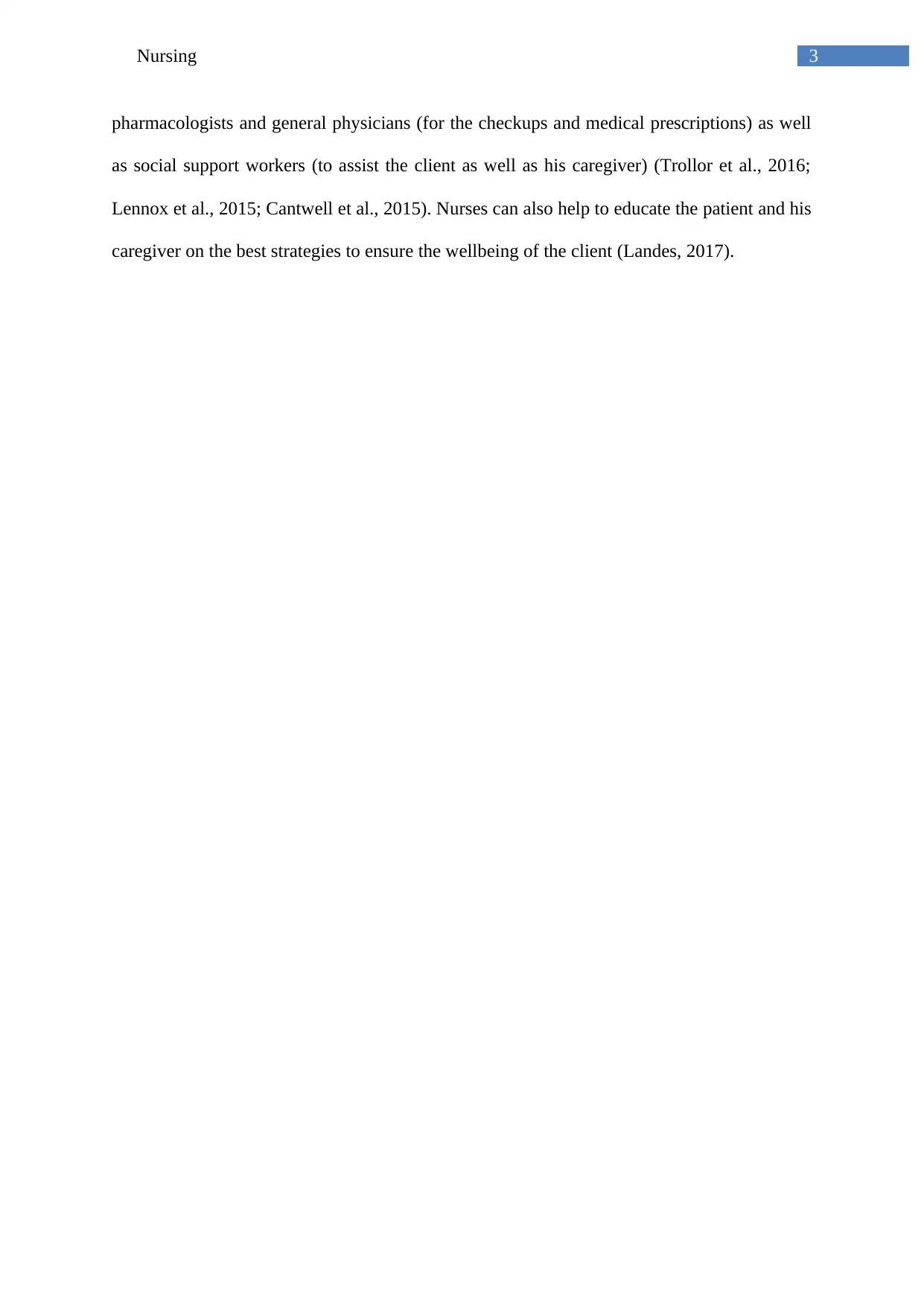
3Nursing
pharmacologists and general physicians (for the checkups and medical prescriptions) as well
as social support workers (to assist the client as well as his caregiver) (Trollor et al., 2016;
Lennox et al., 2015; Cantwell et al., 2015). Nurses can also help to educate the patient and his
caregiver on the best strategies to ensure the wellbeing of the client (Landes, 2017).
pharmacologists and general physicians (for the checkups and medical prescriptions) as well
as social support workers (to assist the client as well as his caregiver) (Trollor et al., 2016;
Lennox et al., 2015; Cantwell et al., 2015). Nurses can also help to educate the patient and his
caregiver on the best strategies to ensure the wellbeing of the client (Landes, 2017).
Paraphrase This Document
Need a fresh take? Get an instant paraphrase of this document with our AI Paraphraser
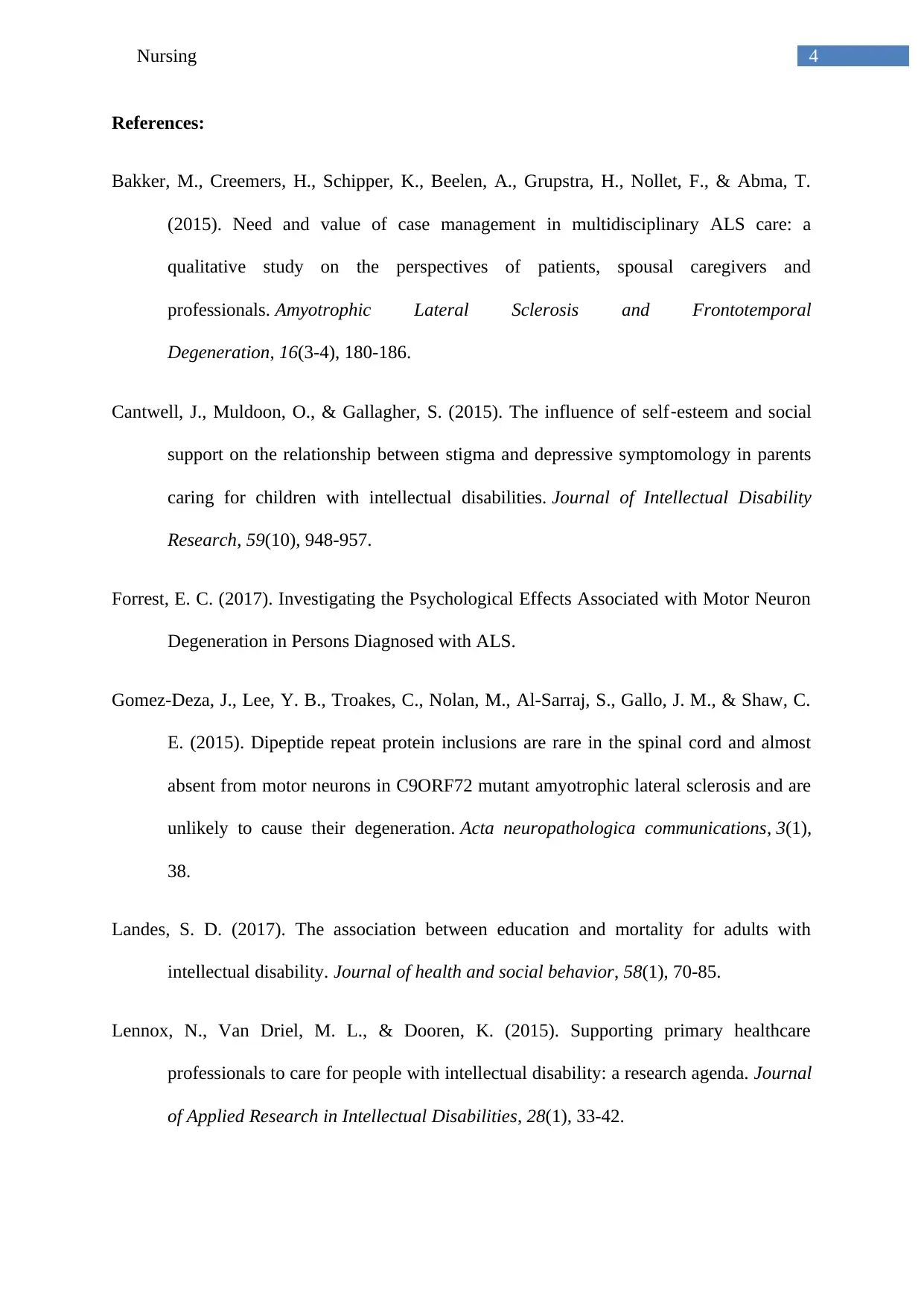
4Nursing
References:
Bakker, M., Creemers, H., Schipper, K., Beelen, A., Grupstra, H., Nollet, F., & Abma, T.
(2015). Need and value of case management in multidisciplinary ALS care: a
qualitative study on the perspectives of patients, spousal caregivers and
professionals. Amyotrophic Lateral Sclerosis and Frontotemporal
Degeneration, 16(3-4), 180-186.
Cantwell, J., Muldoon, O., & Gallagher, S. (2015). The influence of self‐esteem and social
support on the relationship between stigma and depressive symptomology in parents
caring for children with intellectual disabilities. Journal of Intellectual Disability
Research, 59(10), 948-957.
Forrest, E. C. (2017). Investigating the Psychological Effects Associated with Motor Neuron
Degeneration in Persons Diagnosed with ALS.
Gomez-Deza, J., Lee, Y. B., Troakes, C., Nolan, M., Al-Sarraj, S., Gallo, J. M., & Shaw, C.
E. (2015). Dipeptide repeat protein inclusions are rare in the spinal cord and almost
absent from motor neurons in C9ORF72 mutant amyotrophic lateral sclerosis and are
unlikely to cause their degeneration. Acta neuropathologica communications, 3(1),
38.
Landes, S. D. (2017). The association between education and mortality for adults with
intellectual disability. Journal of health and social behavior, 58(1), 70-85.
Lennox, N., Van Driel, M. L., & Dooren, K. (2015). Supporting primary healthcare
professionals to care for people with intellectual disability: a research agenda. Journal
of Applied Research in Intellectual Disabilities, 28(1), 33-42.
References:
Bakker, M., Creemers, H., Schipper, K., Beelen, A., Grupstra, H., Nollet, F., & Abma, T.
(2015). Need and value of case management in multidisciplinary ALS care: a
qualitative study on the perspectives of patients, spousal caregivers and
professionals. Amyotrophic Lateral Sclerosis and Frontotemporal
Degeneration, 16(3-4), 180-186.
Cantwell, J., Muldoon, O., & Gallagher, S. (2015). The influence of self‐esteem and social
support on the relationship between stigma and depressive symptomology in parents
caring for children with intellectual disabilities. Journal of Intellectual Disability
Research, 59(10), 948-957.
Forrest, E. C. (2017). Investigating the Psychological Effects Associated with Motor Neuron
Degeneration in Persons Diagnosed with ALS.
Gomez-Deza, J., Lee, Y. B., Troakes, C., Nolan, M., Al-Sarraj, S., Gallo, J. M., & Shaw, C.
E. (2015). Dipeptide repeat protein inclusions are rare in the spinal cord and almost
absent from motor neurons in C9ORF72 mutant amyotrophic lateral sclerosis and are
unlikely to cause their degeneration. Acta neuropathologica communications, 3(1),
38.
Landes, S. D. (2017). The association between education and mortality for adults with
intellectual disability. Journal of health and social behavior, 58(1), 70-85.
Lennox, N., Van Driel, M. L., & Dooren, K. (2015). Supporting primary healthcare
professionals to care for people with intellectual disability: a research agenda. Journal
of Applied Research in Intellectual Disabilities, 28(1), 33-42.
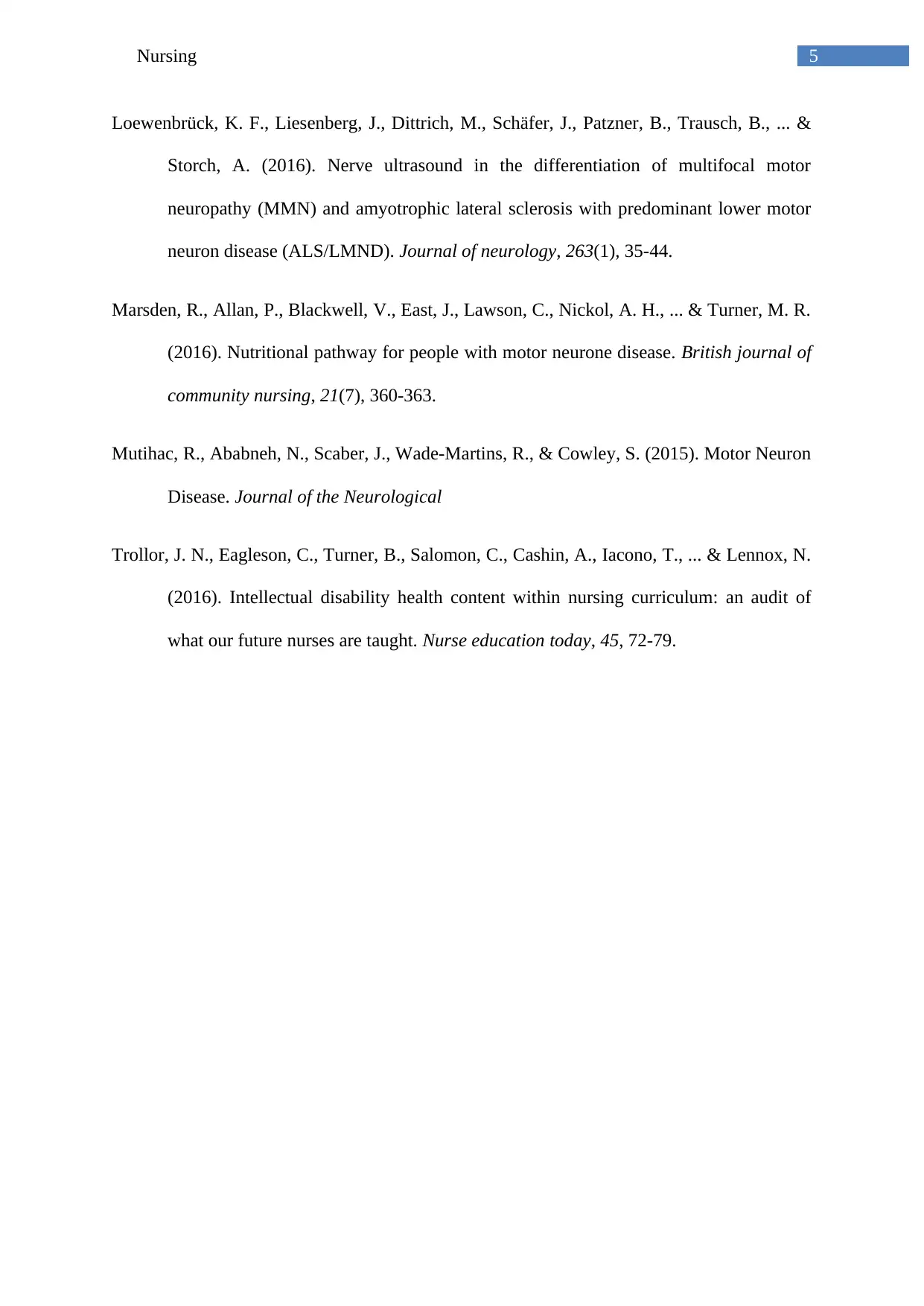
5Nursing
Loewenbrück, K. F., Liesenberg, J., Dittrich, M., Schäfer, J., Patzner, B., Trausch, B., ... &
Storch, A. (2016). Nerve ultrasound in the differentiation of multifocal motor
neuropathy (MMN) and amyotrophic lateral sclerosis with predominant lower motor
neuron disease (ALS/LMND). Journal of neurology, 263(1), 35-44.
Marsden, R., Allan, P., Blackwell, V., East, J., Lawson, C., Nickol, A. H., ... & Turner, M. R.
(2016). Nutritional pathway for people with motor neurone disease. British journal of
community nursing, 21(7), 360-363.
Mutihac, R., Ababneh, N., Scaber, J., Wade-Martins, R., & Cowley, S. (2015). Motor Neuron
Disease. Journal of the Neurological
Trollor, J. N., Eagleson, C., Turner, B., Salomon, C., Cashin, A., Iacono, T., ... & Lennox, N.
(2016). Intellectual disability health content within nursing curriculum: an audit of
what our future nurses are taught. Nurse education today, 45, 72-79.
Loewenbrück, K. F., Liesenberg, J., Dittrich, M., Schäfer, J., Patzner, B., Trausch, B., ... &
Storch, A. (2016). Nerve ultrasound in the differentiation of multifocal motor
neuropathy (MMN) and amyotrophic lateral sclerosis with predominant lower motor
neuron disease (ALS/LMND). Journal of neurology, 263(1), 35-44.
Marsden, R., Allan, P., Blackwell, V., East, J., Lawson, C., Nickol, A. H., ... & Turner, M. R.
(2016). Nutritional pathway for people with motor neurone disease. British journal of
community nursing, 21(7), 360-363.
Mutihac, R., Ababneh, N., Scaber, J., Wade-Martins, R., & Cowley, S. (2015). Motor Neuron
Disease. Journal of the Neurological
Trollor, J. N., Eagleson, C., Turner, B., Salomon, C., Cashin, A., Iacono, T., ... & Lennox, N.
(2016). Intellectual disability health content within nursing curriculum: an audit of
what our future nurses are taught. Nurse education today, 45, 72-79.
⊘ This is a preview!⊘
Do you want full access?
Subscribe today to unlock all pages.

Trusted by 1+ million students worldwide
1 out of 6
Related Documents
Your All-in-One AI-Powered Toolkit for Academic Success.
+13062052269
info@desklib.com
Available 24*7 on WhatsApp / Email
![[object Object]](/_next/static/media/star-bottom.7253800d.svg)
Unlock your academic potential
Copyright © 2020–2026 A2Z Services. All Rights Reserved. Developed and managed by ZUCOL.





